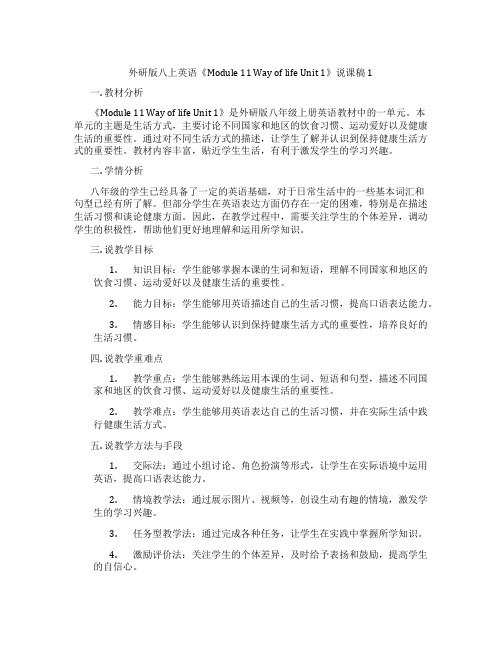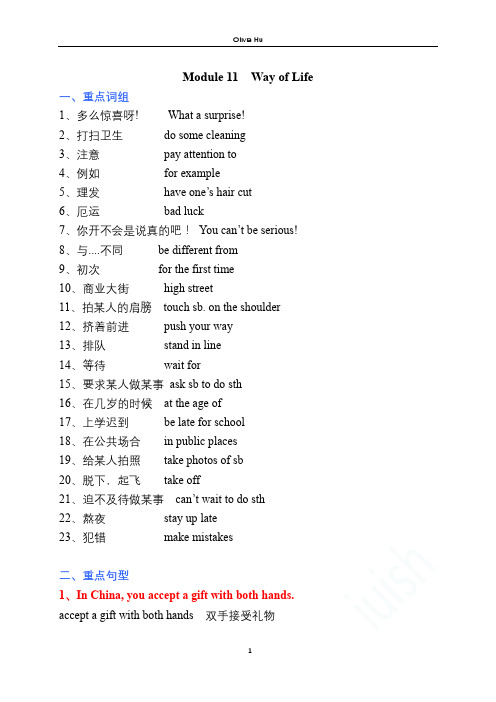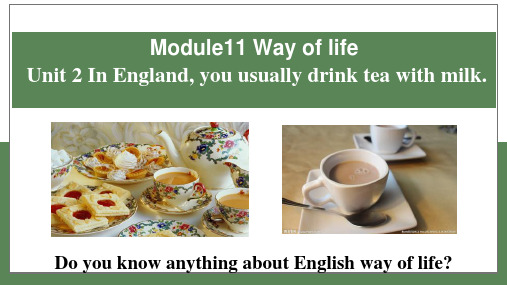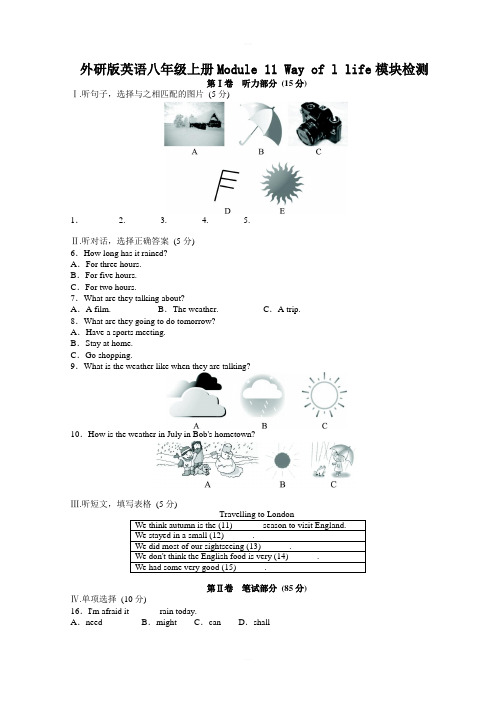外研版八年级英语上册Module 11 Way of life
外研版八上英语《Module11WayoflifeUnit1》说课稿1

外研版八上英语《Module 11 Way of life Unit 1》说课稿1一. 教材分析《Module 11 Way of life Unit 1》是外研版八年级上册英语教材中的一单元。
本单元的主题是生活方式,主要讨论不同国家和地区的饮食习惯、运动爱好以及健康生活的重要性。
通过对不同生活方式的描述,让学生了解并认识到保持健康生活方式的重要性。
教材内容丰富,贴近学生生活,有利于激发学生的学习兴趣。
二. 学情分析八年级的学生已经具备了一定的英语基础,对于日常生活中的一些基本词汇和句型已经有所了解。
但部分学生在英语表达方面仍存在一定的困难,特别是在描述生活习惯和谈论健康方面。
因此,在教学过程中,需要关注学生的个体差异,调动学生的积极性,帮助他们更好地理解和运用所学知识。
三. 说教学目标1.知识目标:学生能够掌握本课的生词和短语,理解不同国家和地区的饮食习惯、运动爱好以及健康生活的重要性。
2.能力目标:学生能够用英语描述自己的生活习惯,提高口语表达能力。
3.情感目标:学生能够认识到保持健康生活方式的重要性,培养良好的生活习惯。
四. 说教学重难点1.教学重点:学生能够熟练运用本课的生词、短语和句型,描述不同国家和地区的饮食习惯、运动爱好以及健康生活的重要性。
2.教学难点:学生能够用英语表达自己的生活习惯,并在实际生活中践行健康生活方式。
五. 说教学方法与手段1.交际法:通过小组讨论、角色扮演等形式,让学生在实际语境中运用英语,提高口语表达能力。
2.情境教学法:通过展示图片、视频等,创设生动有趣的情境,激发学生的学习兴趣。
3.任务型教学法:通过完成各种任务,让学生在实践中掌握所学知识。
4.激励评价法:关注学生的个体差异,及时给予表扬和鼓励,提高学生的自信心。
六. 说教学过程1.导入:通过展示不同国家和地区的饮食习惯、运动爱好等图片,引导学生谈论生活方式,自然引入本课主题。
2.新课呈现:教师引导学生观察图片,让学生说出图片中的食物、运动等,然后板书新词和短语。
外研社八年级英语上册Module11知识点

Module 11 Way of Life一、重点词组1、多么惊喜呀! What a surprise!2、打扫卫生do some cleaning3、注意pay attention to4、例如for example5、理发have one’s hair cut6、厄运bad luck7、你开不会是说真的吧!You can’t be serious!8、与....不同be different from9、初次for the first time10、商业大街high street11、拍某人的肩膀touch sb. on the shoulder12、挤着前进push your way13、排队stand in line14、等待wait for15、要求某人做某事ask sb to do sth16、在几岁的时候at the age of17、上学迟到be late for school18、在公共场合in public places19、给某人拍照take photos of sb20、脱下,起飞take off21、迫不及待做某事can’t wait to do sth22、熬夜stay up late23、犯错make mistakes二、重点句型1、In China, you accept a gift with both hands. accept a gift with both hands 双手接受礼物accept & receiveaccept 是主观上“接受”receive是客观上“收到”2、I’m interested to know all the Chinese traditions.be interested to do sth对做....感兴趣Interesting & interestedinteresting:有趣的,一般指物很吸引人,容易让人产生兴趣;interested:对...感兴趣,一般指人对某物产生了兴趣。
外研版英语八年级上册Module 11 Unit 2课件

Step 6: Discuss
Back in China, the ways of life are different from the English ways of life.
tea time
greeting
visiting friends
Eating food
In England, they eat with_k_n_i_f_e_a_n_d__fo_r_k In China, we eat with_c_h_o_p_s_ti_c_k_s_a_n_d__s_p_oon
P90 The pictures below show two
1 examples. Work in pairs. Talk
_t_e_a_ with _m__i_lk_
when
food
drink
having afternoon tea
Afternoon tea is not just a drink but (also) a light meal at around 4
pm.
下午茶不仅仅是喝茶,而且是下午4点左右的一顿便餐。
P913Βιβλιοθήκη 1 When you are talking to your friends, you may
call them ____.
a) by their first names b) Mr or Mrs
2 When you are invited for afternoon tea, you
will have ____.
F_i_s_h_a_n_d__c_h_ip__s. You can eat it in the shops or _t_a_k_e_i_t_a_w_a_y__.
外研版英语八年级上册Module 11单元知识点归纳总结(详细版)

Module11 Way oflifeUnit1 In China, we open a gift later.1.It’s cool to wear a cap back-to-front.把鸭舌帽前后反过来戴很酷。
2.If she is interested in playing chess, it’s a good idea to choose a chess set as a present.3. We Chinese usually have meals with chopsticks/ while Westerners(西方人) use knives and forks for meals.This pair of chopsticks is pretty nice.(谓语是由pair决定的)A knife and fork ___ on the table now. (is)a knife and fork 一副刀叉表示一个整体,用单数。
4.A bar of chocolate is a perfect choice for those who prefer(更喜欢) sweet food.5.Students need to look up new words in dictionaries to improve their study.6. Little babies would like to play with toys.7. Video games are not popular with teenagers any longer now. 现在电子游戏不再受青少年欢迎了。
8. H ere’s your gift.H ere’s the change(找头,零钱)/money.Here are some flowers for you.9. What a big surprise! n.1)in surprise “惊奇地”常位于动词之后作状语,表示方式。
外研版英语八年级上册Module 11《Way of life》(Unit 2)教学设计

外研版英语八年级上册Module 11《Way of life》(Unit 2)教学设计一. 教材分析《Way of life》(Unit 2)是外研版英语八年级上册Module 11的一部分,主要介绍了不同人的生活状况。
本节课的主要内容包括一个关于不同国家人们生活状况的短文,以及相关的词汇和语法知识。
通过本节课的学习,学生可以了解不同国家人们的生活状况,提高他们的阅读理解能力,同时也可以扩展他们的词汇量和语法知识。
二. 学情分析八年级的学生已经具备了一定的英语基础,能够进行简单的英语交流。
但是,他们的阅读理解能力和词汇量还有待提高。
因此,在教学过程中,需要注重培养学生的阅读理解能力,同时也要注意扩展他们的词汇量和语法知识。
三. 教学目标1.能够理解并朗读课文,掌握课文中的主要词汇和语法知识。
2.能够通过阅读课文,了解不同国家人们的生活状况。
3.能够运用所学的词汇和语法知识,进行简单的英语交流。
四. 教学重难点1.词汇和语法知识的掌握。
2.阅读理解能力的培养。
五. 教学方法1.任务型教学法:通过设定各种任务,让学生在完成任务的过程中,自然地学习和掌握词汇和语法知识。
2.交际型教学法:通过模拟真实的交流场景,让学生在实际交流中,运用所学的词汇和语法知识。
3.情境教学法:通过设定各种生活情境,让学生在情境中,自然地学习和掌握词汇和语法知识。
六. 教学准备1.教材:外研版英语八年级上册Module 11《Way of life》(Unit 2)。
2.多媒体设备:电脑、投影仪等。
3.教学PPT:内容包括课文内容、词汇、语法知识等。
七. 教学过程1.导入(5分钟)通过提问方式,引导学生谈论他们所知道的不同国家人们的生活状况。
例如:“Can you tell me what the life of students in Japan is like?” “What about in the United States?” 通过这样的导入,可以激发学生的兴趣,同时也可以帮助他们回忆起已知的知识。
外研版英语八年级上册Module 11 Way of l life模块检测含答案

外研版英语八年级上册Module 11 Way of l life模块检测第Ⅰ卷听力部分(15分)Ⅰ.听句子,选择与之相匹配的图片(5分)1.______ 2.______ 3.______ 4.______ 5.______Ⅱ.听对话,选择正确答案(5分)6.How long has it rained?A.For three hours.B.For five hours.C.For two hours.7.What are they talking about?A.A film. B.The weather. C.A trip.8.What are they going to do tomorrow?A.Have a sports meeting.B.Stay at home.C.Go shopping.9.What is the weather like when they are talking?10.How is the weather in July in Bob's hometown?Ⅲ.听短文,填写表格(5分)第Ⅱ卷笔试部分(85分)Ⅳ.单项选择(10分)16.I'm afraid it ______ rain today.A.need B.might C.can D.shall17.I like the hat. You look really cool in it.A.not very cold B.not warm C.wonderful D.not bad18.Jim comes to visit us from_time_to_time. That's always the happiest time for the family.A.on time B.sometime C.at times D.some times19.Which picture means “snowy” ?20.Please smile. I'll take a photo ______ you two.A.for B.to C.at D.of21.The video film wasn't interesting at all, ______ the little boy still watched it carefully.A.but B.so C.then D.and22.When it is below 0℃,the weather will be ______.A.hot B.cool C.warm D.freezing23.I think ______ is very important ______ the children to learn to swim.A.it; for B.that; for C.it; of D.that; of24.—It's fine today. How about going cycling?—______A.It's kind of you. B.Are you all right?C.Sounds great! D.How was it?25.It's ______ for them to ______ there in two days because it's very fast to take a plane.A.impossible; arrive in B.possible; arrive inC.impossible; arrive D.possible; arriveⅤ.完形填空(10分)People wear different __26__ of clothes according __27__ the weather conditions in their places.People in warm places have thin clothes __28__ all year round __29__ the temperature there never falls __30__ 18℃.Those places are Guangdong, Hainan, etc.People in __31__ places have to wear warm, thick clothes and even fur clothing __32__ very snowy days, with the temperature as low as -20℃ or even lower. Sometimes in summer the people there also wear thin clothes, but in the early morning and late evening, it is better to change for thicker clothes __33__ they will catch a cold and become ill.In a word, weather decides dressing. What's the weather __34__ in your city and what kind of clothes do you wear?Can you give me a short story __35__ the weather and your dressing?Have a try, please.26.A.kind B.kinds C.type D.colours27.A.to B.with C.in D.for28.A.on B.in C.with D.at29.A.so B.and C.because D.with30.A.up B.down C.below D.through31.A.warm B.cold C.cool D.hot32.A.on B.of C.at D.to33.A.and B.or C.since D.as34.A.forecast B.be C.likes D.like35.A.about B.for C.to D.withⅥ.阅读理解(30分)the rain. Whenever it rains, I'll get wet and have to go back home to change my clothes. It is justA.Kate B.Lucy C.Li Jun D.Simon37.The child from ______ enjoys the rain sound and ______ likes hot days best.A.Ukraine; Li Jun B.China; Lucy C.America; Simon D.Russia; Kate38.T he underlined word “sunbathe” means “______” in Chinese.A.游泳B.晒太阳C.打排球D.洗淋浴39.Which of the following is NOT true?A.Li Jun thinks warm days make him uncomfortable.B.Kate enjoys going outside without a coat in warm weather.C.Lucy likes reading in her warm bed on rainy days.D.Simon likes to swim in the sea or sunbathe on the beach on hot days.40.The form wants to tell us that ______.A.children all over the world like rainy daysB.different children like different kinds of weatherC.different children have different ways to studyD.what children usually do in different kinds of weatherBThe picture below shows the temperature (℃) and the rainfall (mm) of Guangzhou. The temperature isshown as a curve (曲线图).The rainfall is in column (柱形图).41.The rainfall in May is ______.A.230 mm B.300 mm C.350 mm D.400 mm42.There is less rain in August than in ______.A.June B.July C.May D.September43.It's colder in ______ than in any other month.A.January B.February C.November D.December44.The hottest months are ______.A.May and June B.July and August C.June and July D.June and August45.The coldest months are ______.A.Aug. and Jun. B.Jan. and Feb. C.Sep. and Oct. D.Nov. and Dec.CEnglish weather,Everybody talks about the weather in England and this is not surprising. It changes from minute to minute, so it's always interesting. Someone once wisely remarked (评论) that other countries have a climate, but England just has weather!Gretel was amused by all this talk at first, but she has got used to it now.Last week Gretel really understood why everyone is so concerned (关注) about the weather: you can never be certain what's going to happen. Though it was spring, there was a very heavy snowfall. As usual, no one expected it. The pipes in many houses were frozen; trains failed to run; cars went shrunk; there were many accidents on the roads; lots of people slipped on the icy pavements and got hurt; the weather forecast was very bad. Everyone complained gloomily (沮丧地) , “What awful weather we're having!Haven't seen anything like it!” and so on. And then, suddenly, the sun came out, the snow melted and it was spring again.“Typical (典型的)!Just typical!” Gretel remarked.“From the way you talk about the weather, Gretel,” Mr Clark said, “anyone would think you were English.”根据短文内容,回答下列问题。
外研版八年级上册英语《Module11WayoflifeUnit3》说课稿
外研版八年级上册英语《Module 11 Way of life Unit 3》说课稿一. 教材分析《Module 11 Way of life Unit 3》是人教版八年级上册英语教材的一单元,本单元的主题是生活方式。
通过本单元的学习,学生将了解不同国家和地区的文化差异,提高跨文化交际能力。
教材内容主要包括对话和阅读理解,旨在培养学生的听、说、读、写四项基本技能。
二. 学情分析八年级的学生已经具备了一定的英语基础,能够运用简单的英语进行日常交流。
但学生在跨文化交际方面还较为薄弱,对于不同国家和地区的文化差异了解不多。
因此,在教学过程中,教师需要关注学生的文化背景,引导学生理解和尊重文化差异。
三. 说教学目标1.知识目标:学生能够掌握本课的生词和短语,理解对话和阅读材料的内容,了解不同国家和地区的文化差异。
2.技能目标:学生能够在日常生活中运用所学的词汇和句型进行交流,提高听、说、读、写四项基本技能。
3.情感目标:学生能够培养跨文化交际意识,理解和尊重文化差异。
四. 说教学重难点1.重点:学生能够掌握本课的生词和短语,理解对话和阅读材料的内容。
2.难点:学生能够在实际情境中运用所学的词汇和句型进行交流,并能够理解和尊重文化差异。
五. 说教学方法与手段1.教学方法:采用任务型教学法,通过设定真实情境的任务,让学生在完成任务的过程中运用所学知识。
2.教学手段:利用多媒体课件、图片、视频等辅助教学,激发学生的学习兴趣,提高课堂效果。
六. 说教学过程1.导入:教师通过展示不同国家和地区的图片,引导学生谈论各自的生活方式,从而引入本课的主题。
2.新课呈现:教师播放对话和阅读材料的录音,让学生听后回答相关问题,帮助学生理解课文内容。
3.课堂讨论:教师学生分组讨论,让学生分享各自的生活方式和文化特点,培养学生的跨文化交际能力。
4.实践活动:教师设定情境,让学生运用所学知识进行角色扮演或写作练习,提高学生的实际运用能力。
外研版初中英语八年级上册《Module 11》模块分层作业 (含参考答案)
外研版初中英语八年级上册《Module 11》模块分层作业(含参考答案)Module 11 Way of life【时间】四十分钟【设计意图】第ⅠⅡⅢ题:旨在使学生掌握本模块重点词汇,短语以及在句中的使用,层层递进。
首先正确写出短语,其次根据句意做出正确的选择,最后能够适当变形并且完成句子。
第Ⅳ题:完形填空属于能力提升题,旨在培养学生的综合运用能力,使学生能够阅读和介绍关于学校生活的文章。
第Ⅴ.:七选五阅读题使学生提高学生自己的阅读能力。
【基础练】Ⅰ. 模块话题短语积累(10分)(ABC层学生完成)1.坏运气2.理发3.打开一份礼物4.一副国际象棋5.电子游戏6.例如7.对做某事感兴趣8.一些有趣的东西9.认识10.排队Ⅱ.单项选择(10分)(ABC层学生完成)( )1. ---- Whose cap is this?Is it Cindy’s?----- It ______ be hers. Don’t you remember she even didn’t come to the party?A.can’tB. mightC. may notD.must( )2.You’d better ________ hard from now on, ______ you will fail in the exam.A.work ; andB. working ; orC. working; andD. work; or( )3.Now all the e-bike riders in Ningbo ________ wear helmets while riding.A . must B. should C. can D. could( )4.-----Can you open a gift ______________ after you receive it in England?------ Yes . We don’t have to wait.A . mainly B. immediately C. nearly D. loudly( )5.----- Lily, __________ you finish the letter in ten minutes ?------ Yes, I can.A.MustB. shouldC. needD. canⅠ.根据汉语意思完成句子,每空一词。
外研版八年级英语上册Module11讲义含导入及详细知识点
Module 11. Way of life一、主题:社会行为/风俗(5。
*1 behaviour/customs)二、必背单词名词:cap (有檐的)帽子chess国际象棋set (同类事物的)(一)套,(一)副,(一)组chopstick筷子toy玩具gift礼物difference差别;差异tradition传统习俗example例子; 实例month 月;月份experience经历;经验stay逗留;停留sandwish三明治;夹心面包片chip炸土豆条;炸薯条gentleman先生;男士shoulder肩;肩膀动词:accept收受;接受must必须;应该代词:someone某人;有人形容词:video (电子)视频的serious认真严肃地;不开玩笑的副词:immediately立即;当即介词:onto到……之上;向……之上兼类词:surprise n.惊奇;意外之事v.使(某人)吃惊taste v.有……的味道n.味道;滋味三、常用短语1、a chess set 一副国际象棋2、video game 电子游戏3、accept a gift 接受礼物4、in the West 在西方5、Chinese traditions 中国传统6、for example 例如7、do some cleaning 打扫卫生8、have sth. done让某人做某事9、the English way of life英国人的生活方式10、for the first time 首次;初次11、have afternoon tea 喝下午茶12、not just…but…不仅...... 而且....13、tea with milk 奶茶14、fish and chips炸鱼加炸薯条15、traditional food 传统食物16、push one's way onto the bus 挤上公交车17、stand in a line 站成一排18、get on the bus 上公交车19、notice sb. do sth.注意到某人做某事20、touch sb. on the shoulder 拍某人的肩膀21、at the age of 在……岁22、on the……side of the road在马路的……边四、重点句型1、表示否定转移的句型:I don’t think Ishould open it now,2、表示吃惊的句型(1) What a surprise ! (2) You can’t be serious !3、提出建议的句型:(1) And you mustn’t break anything.(2)And you’d better not have your hair cut during the Spring Festival month.(3)Let’s celebrate Lingling's birthday first !五、模块语法情态动词must、can 和need 的用法(You must say Mr or Mrs when you meet someone for the firsttime./You can take it away./ You needn’t wait!)1.Here’s your 91化这是给你的礼物。
外研八年级英语上册《Module 11 Way of life Unit 2》课件
dexapyseraiegnoc.e作动词时,意为“经历h,a经d受”a ,一般作st及ra物n动ge词。e如x:pe我r的ie家nc乡e在
过去的20年里经历了巨大的变化。My home town ___________ great changes
in the last twenty years.
of
3) My experiences in England. 我在英国的经历。experience作名词,当“经 验”讲时,多为不可数名词;当“经历”讲时,通常是可数名词。
她 几教 天英 前语 我很有有一经次验奇。怪的Sh经e 历ha。d I_______m____u__c__h________e__x__p___e__r___i_e__n__c_ie_n_t_e_a_c_h_i_n_g_E_nsgelivsehr.al
1. My experiences in England. 我在英国的经历。
experience作动词时,意为“经历,经 受”,一般作及物动词。如:
My home town experienced great changes in the last twenty years. 我的家乡在过去的20年里经历了巨大的 变化。
a table. cakes and biscuits.
People are trying to get
on a bus.
Task 1
Listen to the passage and answer the following questions.
1. HWehiastwisriWtinagngabHouti Ewnrigtliinsgh awbaoyuot?f life. 2. Heowgivmesanfoyuerxeaxmapmlpesleos.f the English way
- 1、下载文档前请自行甄别文档内容的完整性,平台不提供额外的编辑、内容补充、找答案等附加服务。
- 2、"仅部分预览"的文档,不可在线预览部分如存在完整性等问题,可反馈申请退款(可完整预览的文档不适用该条件!)。
- 3、如文档侵犯您的权益,请联系客服反馈,我们会尽快为您处理(人工客服工作时间:9:00-18:30)。
Homework
1.Learn the useful expressions by heart. 2.Do exercise 2 and 3 in Unit 3 on page 92-93. 3.Write what you must do and what you mustn’t do in China during the Spring Festival.
3.accept a gift 4.do some cleaning 5.Pay much attention to 6.for example 7.on the first day of the Spring Festival
8.have hair cut
Lead-in What is it ?
----Must I hand in my homework this afternoon?
-----No, you needn’t.
拓展:need 作为实意动词时,意思也为“需要” , 后跟名词、代词或动词不定式。 We need to do our homework .
1. 大年初一我们不准扫地。 mustn’t____ do _____ any ______ cleaning on the We ______ first day of the Spring Festival. 2. 你必须回家, 别再玩了。
5.bring a mobile phone to school
7.eat junk food
8.eat the dining table
9.stand eat
Language practice must的用法
1)表示主观的义务和必要, 主要用于肯定句和疑问句中,
意思为 “必须„„,不得不„„,要„„”;由must
Module 11 Way oFra bibliotek lifeUnit 1
In China, we open a gift later.
课前检测
1.多么惊喜呀! 2.打开我的礼物 3接受我的礼物 4.打扫卫生 5.太过于注意 6.例如 7.在春节的第一 天 8.理发
1.What s surprise!
2.open my present/gift
Discuss: When you accept a present, will you open it immediately or later? Will you use both hands or one hand? Listen and find out :
Does Lingling open her present immediately or later?
3.pay much attention to ….
4.be interested to do sth
5.do some cleaning
6.you’d better do sth
7.have your hair cut= cut your hair
8.You can’t be serious!
探究二:语法探究 Language points:情态动词
【答案】D
3. You ____ pay me now.I can easily wait till next week for the money. A.need B. needn’t C. must D. ought to 【答案】B 4. Pay attention to your . A .spell B. spelling C. to spell D. spells 【答案】B 5. I a gift yesterday.But I didn’t . A. received, accepted B. receives, acceptes C.accepted, received D. received, accepting 【答案】A
引起的疑问句,肯定回答要用must或have to, 否定回 答要用needn’t或don’t have to, 意思是“不必”; must的否定形式mustn’t表示禁止,意思是“不准, 不许”。
need 的用法
need 用作情态动词,意为“需要”,常用于否 定句、疑问句及must 引起的一般疑问句的否定 回答,其后用动词原形。例如: You needn’t come to school this afternoon.
She opens it immediately
Listen again and write T or F
1.In the US ,we open a gift immediately.( T ) 2.In China, we accept a gift with both hands.( T ) 3.In China ,people mustn’t must do some cleaning on the first day of the Spring Festival.(F ) 4.Red means good bad luck.(F ) 5.In the south F north of China, people eat lots of jiaozi.()
must 必须 mustn’t 不准,不允许
can
can’t
能
不能 + 动词( 原形 )
need 需要 need’t不必,不需要
1.3.4 8
2.5.6.7 9.7
1.be on time 4.pay attention in class
2.be late
3.do homework 6.eat in class
must ____ go ____ home, stop playing You ____ _______. 3. 你不必现在就走。
needn’t go now. You ________
4. 他不可能是认真的。 can’t___ be serious. He ___
达标测试 1.We throw rubbish into the river .
探究一:知识点探究
Important expressions and everyday English 1.What a surprise! 2.accept a gift with both hands accept 与receive的 用法 receive 只是客观上 收到,但不一定接受。 accept 表示主观上 接受了
A. mustn’t throw B. may not throw
C. can throw D. need throw
【答案】A 2.------Must I hand in my homework now ?
-------No, you . A.mustn’t B. may not C. can D. needn’t
baseball(6 ) chess set( 2) chocolate( 3)
chopsticks( 4)dictionary ( 7) toy(1 ) video game (5 )
What present do they want to buy for Lingling?
An English dictionary
4 video game ( b ) 5 baseball cap (g )
6 chocolate ( e )
7 chopsticks ( f )
Today is Lingling’s birthday .Listen carefully. Number the words and expressions as you hear them .
Good health is over wealth. 健康是最大的财富。
Let’s try to say as many sentences as we can. Anyone who has the longest list is the winner!!! Situations At home At the dining table At school At the cinema In a museum must do… / mustn’t do ...
baseball cap
chess set
a pair of chopsticks
dictionary
Match the new words with the pictures: a b c 1 dictionary ( d ) 2 toy ( c ) 3 chess set ( a ) d f e g
